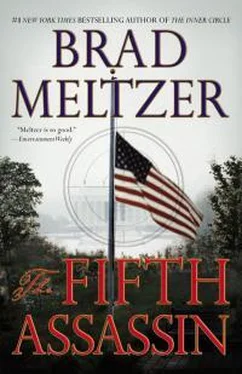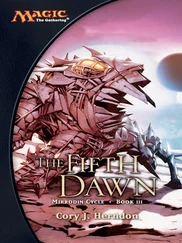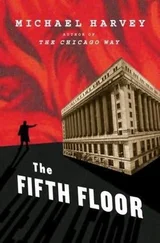“Well, God bless the D.C. Police for cataloging each and every item, because when I went through their full list, there was actually one card missing from the deck: the ace of spades.”
7
Beecher, you lost me,” Tot says.
“The deck of cards,” I say. “It’s missing its ace of spades. He’s carrying a deck of cards where one card is missing!”
“Okay, so unless we’re fighting the Riddler, is that supposed to mean something?”
“Look around…!” I say, pointing from the peephole, to the pine bar in the umbrella stand. “This guy—”
“You mean Marshall.”
“We don’t know it’s Marshall. But whoever he is, he’s meticulously re-created every last detail of Abraham Lincoln’s murder, which, let’s be clear, only happened because John Wilkes Booth was let inside the building after flashing some mysterious long-lost card. And now the one guy we’re looking at happens to be carrying, of all things… long-lost cards.”
“Can I just say,” Hayden interrupts, still struggling to follow, “even if this is the historical card you’re speaking of, who would he even give it to? The church was locked last night. No one was here.”
“What about this morning?” I ask. “He could’ve left it for someone. Were you the first one in?”
“I’m always the first one in. And I told you, when they called me last night, I notified every employee and asked them all to stay home today.”
“What about the guy with the sign-in sheet?” I ask.
“Excuse me?” Hayden says.
“When we walked in… the guy… the one in the cheap suit…” Tot says, holding up the pen he gave him. “He told me we had to sign in.”
“I thought he was—” Hayden stops. “Hold on. He’s not a detective?”
My shirt sticks to my chest. “They said all the detectives were at lunch,” I point out.
Tot looks down at the pen. I’m not sure what he’s staring at. I may know Lincoln history, but he’s been at this far longer than I have. On a hunch, he unscrews the pen as fast as he can. The front half holds the thin metal pen tube. But in the back half… there’s a small red wire connected to an even smaller transmitter. A microphone. We’ve been holding a microphone the entire time.
Tot shoots me a look.
I run full speed, racing back down the aisle of the church and toward the staff offices in back. Whoever this guy is, he couldn’t have gotten far.
8
When we walked in… the guy… the one in the cheap suit…” the older man known as Tot said. “ He told me we had to sign in. ”
“I thought he was—Hold on. He’s not a detective?”
Crossing through the slush on H Street and entering the well-plowed edges of Lafayette Park, Secret Service agent A.J. Ennis kept his pace slow and steady, barely even registering the “cheap suit” comment. Instead, following his training and staying focused on the problem at hand, he turned up the volume on the thin receiver that was tucked into his jacket pocket.
For A.J., it was simple enough to slip them the pen with the transmitter. He’d actually stolen the idea from an overwrought mystery novel he read a few years back where some plucky investigator did the same.
In the novel, the investigator saved the day and, naturally, rode off into the sunset. But A.J. knew that life, especially his current life, was no longer that simple.
“Dammit,” he muttered to himself, seeing the No Signal message on the receiver and running his hand along the back of his buzzed blond hair. They had found the transmitter. Most people never found it, which told A.J. that what they warned him about was right. Beecher and Tot weren’t novices. But then again, neither was A.J.
There was a reason A.J. had been sent to the church. It was the same reason A.J. was the one who accompanied President Orson Wallace out to Camp David, and on that off-the-record visit back in Ohio that tested his loyalty to the President. Luckily for A.J., he had passed.
It wasn’t all luck, of course. As a kid in Johnson City, Tennessee, A.J. Ennis used to dream of being Jacques Cousteau. But when his father got sick and his mother went bankrupt, young A.J.’s dreams became far more realistic.
Not for long. After Business School at Duke and three tedious years as an investment banker, the explorer once again reemerged, knowing that there were more exciting things to chase than money. As he applied for the Secret Service, luck had nothing to do with his getting hired or promoted, or how quickly he made his way over to the President’s Protective Detail. The Service knows talent when it sees it.
What it didn’t know was that thirty years ago, A.J.’s father was one of President Orson Wallace’s dearest friends from law school. A.J. never pointed out the connection or took advantage of it, but he knew it made him lucky.
It made the President’s best friend, Dr. Stewart Palmiotti, even luckier, since after the funeral, A.J. was the one who helped Palmiotti set up his new identity.
Yet the luckiest of all?
A.J.’s phone vibrated in his pocket. Caller ID said “King’s Copiers,” a copy shop in Maryland that had closed at least two years ago. Maybe even three.
“A.J. here,” he said, picking up.
There was silence on the other end.
“You were right about the church,” A.J. said.
There was no reply.
“They’re both there. I saw him. It was definitely Beecher.” Before another bit of silence hit, A.J. added, “I know it’s not ideal, sir. But it doesn’t mean it’s a total disaster. We can still—”
There was a click. The President of the United States hung up.
With a flurry of tapping, A.J. dialed another number.
The phone rang once… twice…
Palmiotti picked up without even saying hello. “Where’ve you been?” he asked. “Do you need me down there? I can be there in—”
“Don’t come down here.”
“But I can—”
A.J. wanted to scream at him. But in these past few months, he knew what Palmiotti had been through, and what he’d sacrificed to keep their secret safe. With the fake funeral, Palmiotti now had a second chance. That’s how he saw it. This was his chance to make it all right.
That didn’t mean it was easy. The physical recovery took longer than expected; Clementine had shot him straight through the neck. Plus, there was that incident when he asked if he could contact Lydia—his girlfriend—to say a more proper goodbye. But A.J. knew how Palmiotti was when it came to President Wallace. Palmiotti didn’t just love Wallace. He needed him. That was the right word. Need. And the President needed him back.
“We can definitely use your help. He needs your help,” A.J. said, leaning hard on the word He .
“And he’ll have it. I can fix it,” Palmiotti promised.
“That’s what you said a week ago.”
Palmiotti stopped at that. “So the church—Is it really that bad?”
“Bad enough that he called me .”
“He called you ?”
“Look around, Doc,” A.J. said, standing at the southern end of Lafayette Park and turning from the tall marble columns of the White House, back toward the double-tiered bell tower of St. John’s Church. “Do you have any idea what you’ve unleashed?”
9
Forget it, Beecher. He’s long gone,” Tot says, slowly making his way down the brick steps to join me outside. Up the block, there’s nothing but passing cars along H Street.
“You think he’s our killer?”
Tot shakes his head. “Sneaking back into his own crime scene with cops in the building? Even crazy people aren’t that crazy.”
“So he’s police?”
“He’s a fed. Or something worse. Look,” he says, tossing me the two pieces of the microphone pen. “Motion-activated so it doesn’t need a battery. Hairline mic that amplifies through the pen chamber. You don’t buy that at the local spy shop.”
Читать дальше











